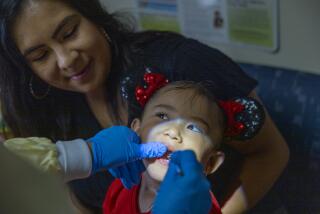Dentists Make Some Piercing Comments
- Share via
It’s official. Oral piercing is a “public health hazard.” That’s according to the American Dental Assn., which passed a resolution opposing oral piercing at its recent annual convention.
The ADA has lots to say about the hazards of oral piercing, which include: infection, airway obstruction, trauma to teeth, interference with chewing and speaking, hypersensitivity to metals, foreign debris in the pierced site and breathing difficulty should an adornment be swallowed.
The dentists, who held their convention in that hotbed of piercing zeal, San Francisco, vowed to conduct ongoing reviews of scientific literature on the health risks of piercing and promote more public education on the risks.
“Oral piercing would be obsolete if the decision rested solely in the hands of the ADA,” said the organization’s press release.
Now, that’s a tongue-lashing.
Where to Hide the Relatives
Medical journals aren’t known for their catchy headlines. But we love this one: “The Trouble With Families.”
The report in a recent issue of the Annals of Internal Medicine discusses the very subject that makes shows like “ER,” “Chicago Hope” and “L.A. Doctors” so fun to watch--the patients’ relatives.
When asked what was the most difficult aspect of end-of-life care, doctors in several New York City hospitals answered almost unanimously with “families.” One doctor said: “They’re too emotional. They don’t understand what’s going on.”
Well, excuse us for being a little upset if Uncle Arthur is in pain and dying and for lacking medical degrees. The authors of the report agree. The authors, both female nondoctors, chide physicians for their “persistent tendency to equate families with trouble.”
Families, the authors say, want understandable and timely information, recognition of their anxiety and their limitations in caring for an ill loved one and guidance on defining their roles.
“A health care system that depends so heavily on the patient care and management provided by families should involve families as partners rather than define them as problems,” the authors state.
The Many Faces of Baby-Faced Boys?
Here’s more proof of the wisdom of the adage that looks deceive. A set of studies recently found that baby-faced boys tested higher on academic achievement exams than their more mature-looking peers. This refutes the stereotype that baby-faced people aren’t as smart.
Another study found that baby-faced boys were more likely to be delinquent and committed more crimes than their peers.
Why do baby-faced boys tend to belie their image? There may be a tendency for baby-faced boys to intentionally try to offset their image as sweet, kind, nice and submissive by acting hostile and aggressive, the authors of the study suggest. (By the way, there is no evidence that the behavior of baby-faced girls is affected by their looks.)
The researchers noted that there is not enough information to suggest what this all means. But, they say, perhaps there is a stronger link between appearance and behavior than people suspect.





